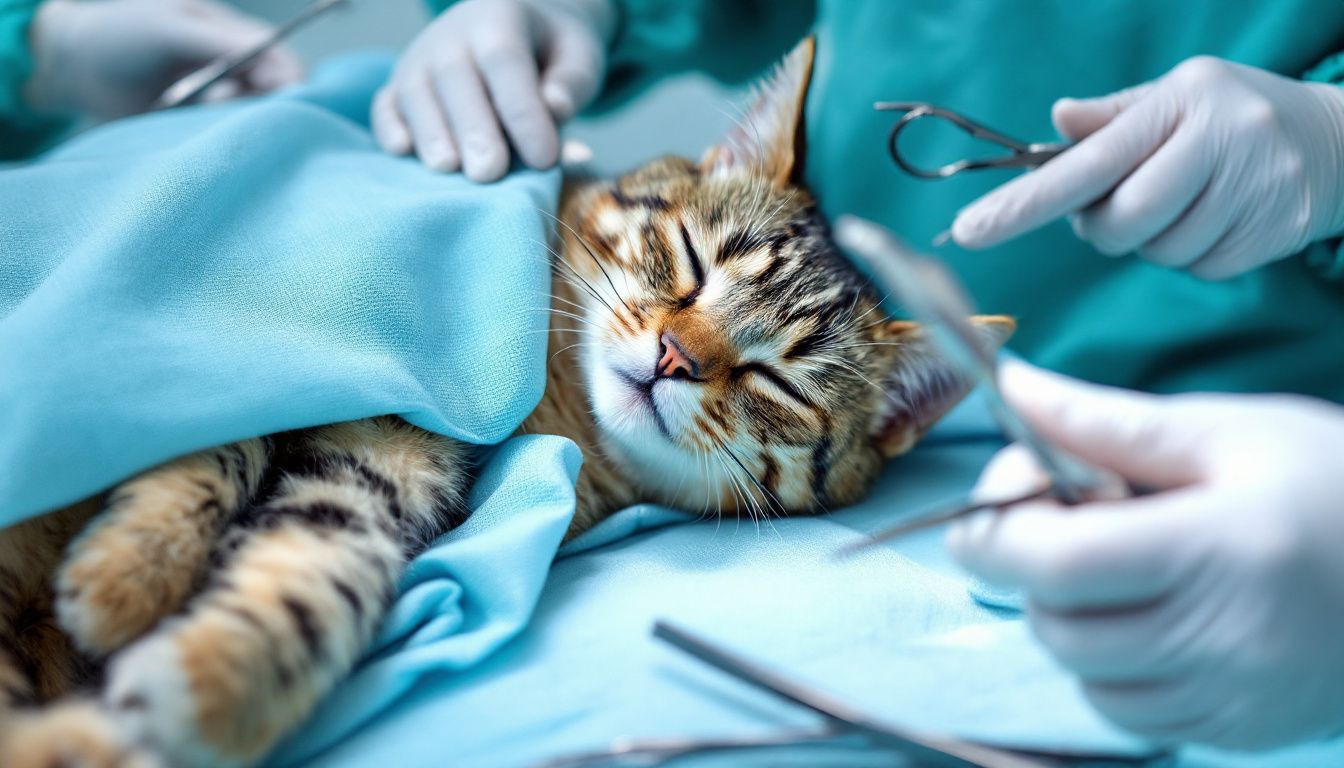
Neutering is a significant step in your kitten’s life, and the recovery process requires your attention. The first 24-48 hours are critical for ensuring their comfort and safety. You need to know how to care for kitten after neuter to help them heal properly. Monitor their behavior closely, keep the incision area clean, and create a calm environment. These steps reduce stress and prevent complications.
With proper care, your kitten will recover quickly and return to their playful self in no time.
How to Care for Kitten After Neuter: Immediate Post-Surgery Steps
Create a Quiet and Comfortable Space
Choose a warm, quiet area away from other pets and distractions.
After surgery, your kitten needs a calm and peaceful environment to rest and recover. Choose a comfortable and quiet space in your home, away from loud noises, other pets, or active children. This will help reduce stress and allow your kitten to feel safe.
Provide soft bedding and ensure the space is free of hazards.
Place soft, clean bedding in the recovery area to keep your kitten warm and cozy.
Check the space for potential hazards like sharp objects, cords, or small items that could be swallowed.
A safe and secure environment is hugely beneficial for a smooth recovery.
Monitor Your Kitten’s Behavior
Expect grogginess or disorientation from anesthesia for the first 24 hours.
You may notice your kitten acting groggy or disoriented after surgery. This is normal and usually resolves within 24 hours. Keep an eye on their movements to ensure they don’t accidentally hurt themselves while adjusting to the effects of anesthesia.
Watch for signs of pain, such as excessive meowing, hiding, or lack of movement.
Pay close attention to cat behavior after surgery. Signs of pain or discomfort may include persistent hiding, lack of appetite, or unusual lethargy. Other indicators include a hunched posture, tense abdominal muscles, or growling.
If you notice these behaviors, contact your veterinarian for advice.
What You Need
A clean, quiet space, soft bedding, and access to fresh water.
Prepare the recovery area with all the essentials. Provide fresh water within easy reach and ensure the bedding is clean and soft. These small steps can make a big difference in your kitten’s comfort.
An Elizabethan collar (e-collar) or recovery suit to prevent licking.
To protect the incision site, use an e-collar or recovery suit. These tools prevent your kitten from licking or scratching the area, which could lead to infection.
Make sure the Elizabethan collar fits properly and doesn’t cause additional discomfort.
It is important to create a comfortable and quiet space, monitor their behavior and using the right tools will help your kitten heal faster. You can expect after neutering that your kitten may seem a little off, but with proper care, they’ll bounce back quickly.
Managing the Incision Site After Spaying or Neutering
Keep the Area Clean and Dry
Avoid bathing your kitten until the incision is fully healed.
Keeping the incision sites clean is crucial for your kitten’s recovery. Avoid bathing your kitten until the vet confirms the incision has healed completely. Water can introduce bacteria to the area, increasing the risk of infection.
Instead, use a damp cloth to clean areas away from the incision if necessary.
Check the incision twice daily for redness, swelling, or discharge.
Inspect the incision site twice a day to ensure it is healing properly. Look for signs of redness, swelling, or unusual discharge. These could indicate an infection. If you notice any of these symptoms, contact your veterinarian immediately.
Regular checks help you catch potential issues early.
Prevent Licking or Scratching
Use an e-collar or recovery suit to stop your kitten from licking the incision.
Your kitten may instinctively try to lick or scratch the incision. This behavior can delay healing or cause infections. To prevent your cat from licking the area, use an Elizabethan collar (e-collar) or a recovery suit.
These tools act as barriers, keeping the incision safe while your kitten heals.
Distract your kitten with toys or gentle play if they seem fixated on the area.
If your kitten becomes overly focused on the incision, offer distractions.
Use toys or engage them in gentle play to redirect their attention.
Avoid jumping or running activities, as these can strain the incision site.
Common Mistakes to Avoid
Allowing your kitten to lick the incision, which can lead to infection.
Letting your kitten lick the incision is one of the most common mistakes. This can introduce bacteria and cause infections, delaying recovery. Always use protective measures like an e-collar to prevent this.
Ignoring signs of irritation or infection around the incision site.
Overlooking signs of irritation, such as redness or swelling, can lead to complications. Pay close attention to the incision during daily checks.
Early intervention ensures your kitten recovers without unnecessary discomfort.
Taking these steps will help your kitten recover smoothly after castration. Keep the incision sites clean, monitor for signs of infection, and prevent your cat from licking the area. These efforts will ensure a safe and comfortable healing process.
Feeding and Hydration Aftercare Guidelines
Adjust Feeding After Surgery
Offer a small meal a few hours after surgery to prevent nausea.
After surgery, your kitten’s stomach may feel sensitive. Offer a small portion of their usual food a few hours after they return home. This helps prevent nausea while ensuring they get some nourishment.
Avoid overfeeding, as their appetite may still be recovering from the effects of anesthesia.
Gradually return to your kitten’s regular feeding schedule within 24 hours.
Within 24 hours, your kitten should resume their normal feeding routine. Consult your veterinarian for specific instructions if you’re unsure about their diet.
You can also ask if semi-moist or moist food, slightly warmed, would encourage eating.
Ensure Proper Hydration
Provide fresh water at all times and encourage your kitten to drink.
Keeping your cat hydrated is essential for their recovery.
Place fresh, clean water in an easily accessible spot.
A water fountain can be a great option to encourage drinking, as kittens often find moving water more appealing.
Monitor for signs of dehydration, such as lethargy or dry gums.
Dehydration can slow down healing and make your kitten uncomfortable. Watch for signs like dry gums, reduced energy, or skin that doesn’t bounce back when gently pinched. If you notice these symptoms, offer wet food to increase moisture intake.
Severe cases may require veterinary attention.
Potential Challenges
Your kitten may have a reduced appetite for the first day.
It’s normal for your kitten to eat less on the first day after surgery. Monitor your cat’s appetite closely. If they refuse food entirely, try offering a semi-moist diet at room temperature to make it more appealing.
Contact your vet if your kitten refuses to eat or drink for more than 24 hours.
A lack of appetite or thirst beyond 24 hours could indicate a problem. Contact your veterinarian immediately for guidance. They may recommend additional steps or treatments to ensure your kitten stays nourished and hydrated.
|
Recommendation |
Description |
|---|---|
|
Feeding Instructions |
Ask your vet about acceptable diets and meal preparation methods post-surgery. |
|
Hydration Strategies |
Provide fresh water at all times; consider using a water fountain. |
|
Dietary Recommendations |
Offer semi-moist or moist food at room temperature to promote eating. |
Limiting Physical Activity and Ensuring Rest After Neutering
Restrict Movement
Keep your kitten in a confined space to prevent jumping or running.
After neutering, your kitten’s incision needs time to heal. To protect it, you must limit physical activity. Confine your kitten to a small, safe area, such as a bathroom or a playpen. This prevents them from jumping or running, which could strain the incision.
Removing cat trees and other climbing structures is also essential. If your kitten is particularly active, consider using a crate to restrict movement further.
Avoid letting your kitten climb stairs or furniture during recovery.
Climbing stairs or furniture can put unnecessary pressure on the incision site. Block access to stairs and high surfaces to keep your kitten safe. Supervise them closely during recovery to ensure they don’t attempt to climb or jump.
If you have other cats, separate them to discourage playful interactions that could lead to accidental injuries.
Encourage Rest
Provide a calm environment to help your kitten relax and sleep.
Rest is vital for your kitten’s recovery. Create a quiet, stress-free environment where they can relax. Keep the recovery area away from loud noises or busy parts of your home.
Soft bedding and dim lighting can help your kitten feel more comfortable and encourage them to sleep.
Limit interactions with other pets or children to reduce stress.
Interactions with other pets or children can overstimulate your kitten and disrupt their rest. Isolate your kitten during the recovery period to minimize stress. This also reduces the risk of accidental rough play, which could harm the incision site.
Common Mistakes to Avoid
Allowing your kitten to play too soon, which can reopen the incision.
Letting your kitten resume playtime too early can lead to serious complications. Active movements like jumping or running may reopen the incision and delay healing. Always follow your veterinarian’s advice on when it’s safe to reintroduce play.
Not supervising your kitten during recovery, leading to accidental injuries.
Failing to monitor your kitten can result in accidents. Even in a confined space, kittens may find ways to climb or jump. Stay vigilant and check on them frequently to ensure they remain safe. Administer medication as directed to manage pain and keep your kitten comfortable during this period.
Taking these steps will help your kitten recover smoothly. A quiet environment, restricted movement, and proper supervision are key to ensuring a safe and stress-free healing process.
Recognizing Signs of Complications After Spaying or Neutering
When to Call the Vet
Signs of infection, such as redness, swelling, or discharge from the incision.
Monitoring your kitten’s incision site is one of the most important steps in post-operative care. Redness, swelling, or discharge around the incision could indicate an infection. These signs require immediate attention from your veterinarian.
Check the area at least twice daily to catch any abnormalities early. Keeping the incision clean and dry helps reduce the risk of complications.
Persistent vomiting, diarrhea, or refusal to eat or drink.
Your kitten’s appetite and digestion should return to normal within 24 hours after neutering. Persistent vomiting, diarrhea, or a refusal to eat or drink may signal a serious issue. These symptoms can lead to dehydration, which slows healing.
If your kitten shows these signs, contact your vet promptly for guidance.
Other Warning Signs
Excessive lethargy or difficulty breathing.
While some tiredness is normal after surgery, excessive lethargy could mean your kitten is in pain or experiencing a complication. Difficulty breathing is another red flag that requires immediate veterinary attention.
Knowing if a cat is in pain can help you act quickly. Look for signs of pain like a hunched posture or unusual vocalizations.
Bleeding from the incision or any unusual behavior.
Bleeding from the incision site is not normal and should be addressed right away. Unusual behaviors like constant hiding or aggression may also indicate discomfort or pain. Understanding how to tell if a cat is in pain ensures you can identify these issues early.
What Else to Know
Most kittens recover quickly, but every pet is different.
Every kitten heals at their own pace. While most recover within a week, some may take longer. Follow your vet’s post-operative advice closely to ensure your kitten’s recovery stays on track.
Follow your vet’s instructions closely and don’t hesitate to ask questions.
Veterinarians often provide detailed instructions for aftercare. These typically include activity restrictions, dietary guidelines, and incision monitoring. Ask your vet for clarification if you’re unsure about any part of the process.
Staying informed helps you provide the best care for your kitten after spaying or neutering.
Caring for your kitten after neutering involves consistent attention and thoughtful post-surgical care. Focus on creating a calm environment where your kitten feels safe. Monitor the incision site daily to ensure proper healing. Provide nutritious meals and fresh water to support recovery. Encourage rest by limiting physical activity and interactions with other pets. If you notice any signs of complications, contact your veterinarian immediately. These steps will keep your cat comfortable and help them recover quickly.
Your kitten will soon return to their playful and energetic self with your care.
FAQ
How long does it take for a kitten to recover after neutering?
Most kittens recover within 7-10 days. During this time, their behavior and incision site will be monitored closely. Follow your vet’s aftercare instructions to ensure proper healing.
Can I let my kitten play after neutering?
Limit physical activity for at least 10 days. Prevent jumping, running, or climbing to avoid reopening the incision. Create a confined space to keep your kitten safe during recovery.
Is it normal for my kitten to sleep a lot after neutering?
Yes, sleeping more than usual is normal after surgery. Anesthesia and the healing process can make your kitten feel tired. Ensure they have a quiet, comfortable space to rest.
What should I do if my kitten refuses to eat after neutering?
Offer a small, soft meal a few hours after surgery. Contact your vet if your kitten refuses to eat for more than 24 hours. Appetite loss could indicate a complication.
How can I prevent my kitten from licking the incision?
Use an Elizabethan collar or recovery suit to stop licking. These tools protect the incision and prevent infections. Distract your kitten with toys if they seem fixated on the area.

In her previous life, Lisa traveled extensively, both for work and leisure. After the pandemic struck, Lisa locked up her luggage and adopted a cat ever since.
Lisa is now an avid cat lover, she devotes most of her free time serving as butler to her adorable feline at home. When she is not with her cat, she can be seen using her phone sourcing for the latest cat supplies online.


